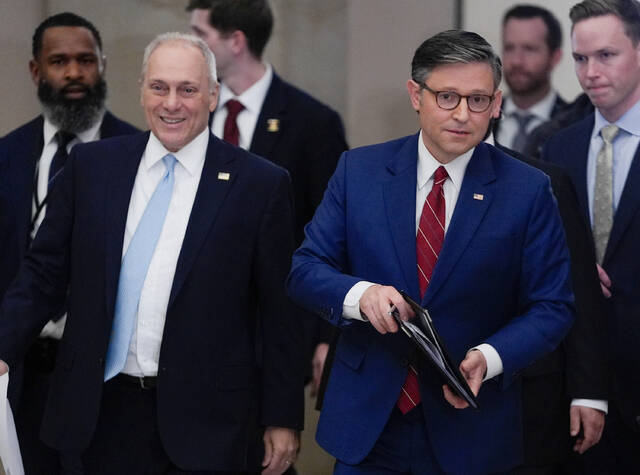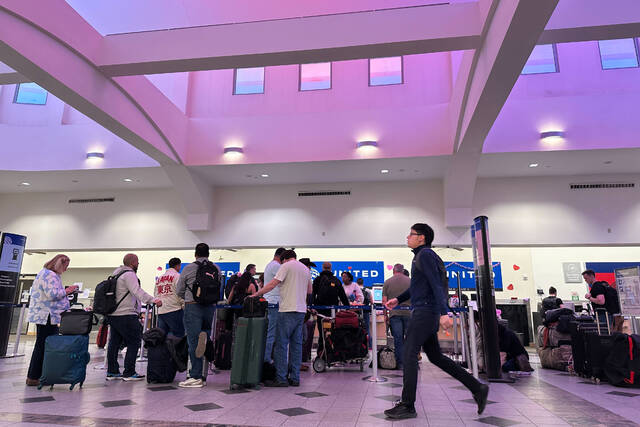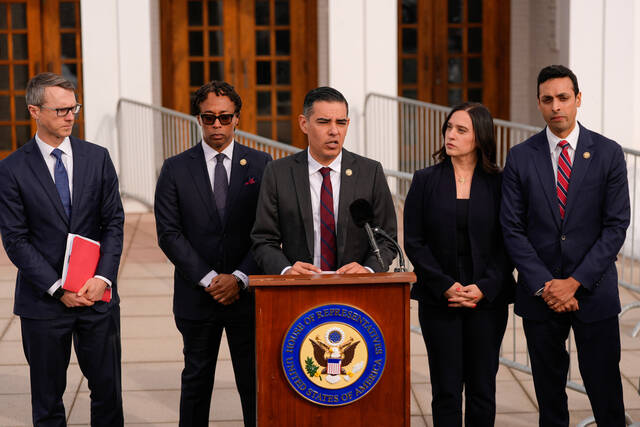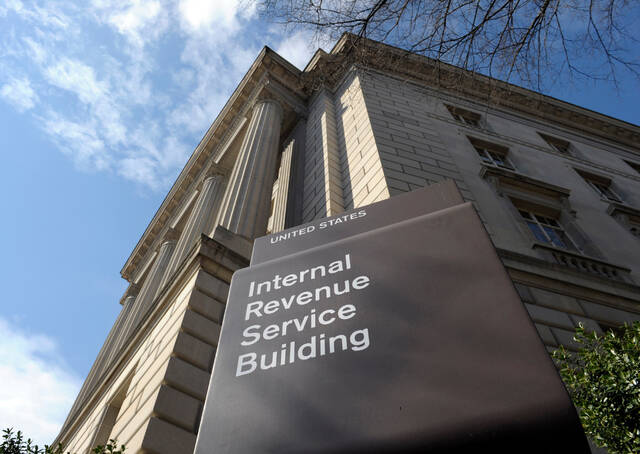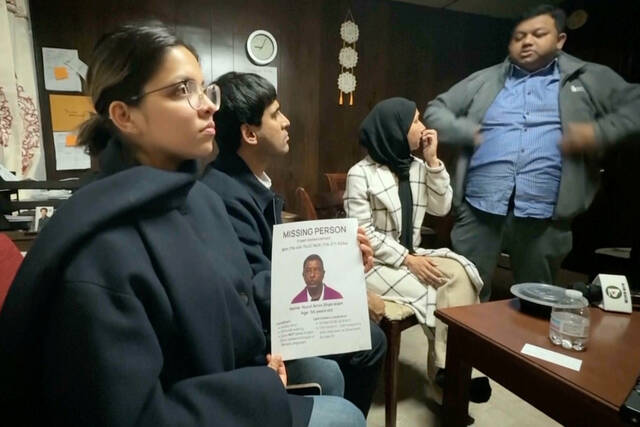WASHINGTON – The House of Representatives voted Wednesday to end the longest government shutdown in U.S. history, moving past a political mess that has lasted for 43 days and left millions of Americans unable to travel or afford food.
The measure passed on a vote of 222-209 and now heads to the desk of President Donald Trump, whose expected signature around 9:45 p.m. will begin to resolve mass chaos across the country prompted by the crisis.
After weeks without pay, hundreds of thousands of government workers will head back to work in the coming days. Under the terms of the funding package, they’ll be compensated retroactively even though they have not been on the job.
Shuttered preschool and food benefit programs will reopen. So will federal agencies and national landmarks. Despite delays, government data that’s crucial to understanding the American economy will start circulating again.
Time will tell exactly who, if anyone, gained from the high-stakes political gambit.
But as Republicans and Democrats yelled at each other on the floor of the Capitol Wednesday night, the partisan divisions underscored just how fractured Washington remains – and how many people can get hurt when politicians can’t work together.
“We can and must do better,” said Rep. Adelita Grijalva, D-Arizona, the newest member of Congress who was sworn in just before the vote.
Added House Speaker Mike Johnson in remarks to reporters after the vote, “We got the government open. Let’s celebrate tonight.”
Johnson: GOP will ‘demand a lot of reforms’ on Obamacare subsidies
House Speaker Mike Johnson would not commit to bringing an extension of healthcare subsidies to the floor after the shutdown vote.
A future vote on the subsidies was at the core of an agreement that eight Senate Democrats cut with Republicans in that chamber to reopen the government.
Johnson wasn’t among them.
The GOP leader said at a post-vote press conference that he’d be willing to work with anyone in Congress who wants to lower the cost of healthcare. But he said the Affordable Care Act does not do that.
“The Republicans would demand a lot of reforms before anything like that was ever possible,” he said.
Six House Democrats vote with Republicans to reopen government
Six House Democrats joined Republicans Wednesday night to pass a funding bill to reopen the federal government, bucking most of their part to end the nation’s longest-ever shutdown.
They are Henry Cuellar of Texas, Don Davis of North Carolina, Jared Golden of Maine, Adam Gray of California, Marie Gluesenkamp Perez of Washington, and Tom Suozzi of New York.
The group of six Democrats is made up of all moderates, each from swing congressional districts, including one Democrat – Golden – who opted against reelection in 2026.
The shutdown deal passed 222-209 in the Republican-controlled House, meaning their votes weren’t necessary to put the bill over the finish line. Two Republicans – Thomas Massie of Kentucky and Greg Steube of Florida – voted against the continuing resolution. -Joey Garrison
‘Way out of line’: Johnson pledges to repeal provision letting senators sue
House Speaker Mike Johnson says he spoke to Senate Majority Leader John Thune this morning about a provision in the spending bill that would allow senators whose phone records were secretly obtained to sue the federal government.
The measure uniquely benefits a group of Republican lawmakers whose records were subpoenaed by Special Counsel Jack Smith during the Jan. 6 riot investigation
“I was very angry about it. I was,” Johnson said. “We had no idea. That was dropped in at the last minute, and I did not appreciate that. Nor did most of the House members. Many of them were – are – very angry about that.”
The House will vote to repeal the provision next week. Johnson said he did not ask Thune for a commitment to bring the House bill to the floor but said he expects senators to do the same thing.
“I think that was way out of line,” Johnson said.
Incoming New Jersey Gov. Mikie Sherrill gives notice of House resignation
Moments after the House closed its vote, the House clerk read aloud New Jersey Rep. Mikie Sherrill’s notice of her upcoming resignation from her committee assignments in Congress.
The Democratic congresswoman won the Nov. 4 election for governor of her state. She has represented New Jersey’s 11th congressional district since 2019.
A spokesperson for Sherrill said the lawmaker intends to formally submit her resignation from office next week and will work with House leadership and incumbent New Jersey Gov. Phil Murphy on an effective date.
Johnson blasts shutdown as a pointless exercise in final remarks
House Speaker Mike Johnson declared “the whole exercise was pointless” as he delivered final remarks on the floor before a vote to reopen the government, calling the shutdown “wrong and cruel.”
Johnson kept his remarks brief, telling the chamber, “We need to get this government open as soon as possible.
The chamber then proceeded on a vote to end the 43-day government closure.
Jeffries on the House floor: ‘This fight is not over’
House Minority Leader Hakeem Jeffries, D-New York, said in a floor speech just ahead of the chamber’s final vote that Democrats’ fight to extend Obamacare tax credits isn’t over, even if the government shutdown nearly is.
In remarks that previewed House Democrats’ 2026 midterm election message, Jeffries said, “There’s only two ways that this fight will end: either Republicans finally decide to extend the Affordable Care Act tax credits this year, or the American people will throw Republicans out of their jobs next year and end the speakership of Donald J. Trump once and for all. That’s how this fight ends.”
The expanded tax credits are set to expire on Dec. 31.
Trump to immediately sign bill reopening government
President Donald Trump expects the legislation under consideration by the House of Representatives to pass and plans to sign into law late Wednesday evening.
The White House shared an updated version of Trump’s public schedule that showed him signing the bill that hasn’t yet passed at 9:45 pm ET.
Trump will sign the legislation on camera, in front of reporters, in the Oval Office, leaving open the possibility that he’ll take questions from the media on other topics such as the Jeffrey Epstein files.
House begins debate on bill to reopen government
The House held two process votes on Wednesday evening in the lead-up to their consideration of a bill that would reopen the federal government and fund it through Jan. 30.
Those votes were an important gauge for House leaders of how many lawmakers were back in DC after facing travel and weather delays. Republicans had enough support to advance the legislation to a final vote but the measure still has to win a majority.
In the first vote, three Republicans and one Democrat were missing. Lawmakers are expected to take their next vote after an hour of floor debate around 7:30 pm ET.
Grijalva code-switches in first remarks after sworn in
The granddaughter of a bracero, who waited 50 days to take her seat in Congress, Rep. Adelita Grijalva stepped to the podium on the House floor and told her colleagues “our democracy works when everyone has a voice.”
“Este momento es histórico para nuestra comunidad,” Grijalva said in Spanish, offering no translation to her hundreds of colleagues on the House floor. (“This is a historic moment for our community,” she said.)
During her roughly five minute speech, Grijalva seamlessly switched between English and Spanish, a commonality for many who grew up along the U.S.-Mexico border, when speaking to her colleagues while also directing some of her remarks to the Latino community.
Code-switching is the practice of selectively switching between languages during a conversation, a phenomenon that’s deeply familiar to bilingual and multilingual people in the U.S. – Rebecca Morin
Rep. Adelita Grijalva sworn in after long delay
In his first order of business after a nearly two-month-long recess, Speaker Mike Johnson swore in Arizona Democratic congresswoman Adelita Grijalva.
The swearing in took place seven weeks after her special election victory to take her late father’s place in Congress in September. The delay drew widespread rebukes from Democrats.
Her addition means there’s likely enough support in the House to force a vote on a measure to release more government files related to Jeffrey Epstein.
“I will sign the discharge petition right now to release the Epstein files,” Grijalva said on the House floor, referencing the push.
What comes next? When will the House vote?
The House convenes at noon for the first time since before the shutdown began Oct. 1, and debate on legislation to end the shutdown is expected to begin at about 5 p.m.
House Majority Leader Steve Scalise, R-Louisiana, estimated the first of several votes would come shortly after, and voting should be completed by 8 p.m.
House will vote on repealing provision that allows senators to sue over phone records
Speaker Mike Johnson said Wednesday that Republicans will introduce legislation next week to repeal a controversial provision in the funding package.
The measure allows a group of GOP senators to sue the federal government for hundreds of thousands of dollars over the Biden administration subpoenaing their phone records as part of an investigation into the Jan. 6 insurrection. When some of the lawmakers recently learned their communications were involved, they were irate.
But Republicans in the House, including Tom Cole of Oklahoma, the powerful chair of the appropriations committee, said in recent days they were unaware of the provision before it was attached to the legislation to reopen the government.
Rep. Austin Scott, R-Georgia, denounced the addition during a congressional hearing Tuesday night, saying it set a dangerous precedent.
“What they did is wrong,” Scott said. “There’s actually a list of people that know they will get paid as soon as this thing is signed. Or at least they’ve got the coupon, and all they have to do is go file it at the courthouse and get paid.”
Democrats rip into GOP over contentious lawsuit measure
Democrats bashed Republicans over the provision in the shutdown-ending funding package that would allow GOP senators to sue the federal government if their electronic records are secretly obtained.
Rep. Jim McGovern, D-Massachusetts, said the measure would allow the lawmakers to “shovel millions of dollars into their own wallets.”
“It’s probably the most brazen theft and plunder of public resources ever proposed in the United States Congress,” he said.
Rep. Jamie Raskin, D-Maryland, called it the “single-most corrupt provision for legislative self-dealing that anyone in this chamber today has ever voted on.”
White House: Trump plans to sign legislation Wednesday night ending shutdown
President Trump plans to sign a funding package Wednesday night ending the shutdown once it passes the House of Representatives, White House Press Secretary Karoline Leavitt said.
As House readies for shutdown vote, Democrats release Epstein emails
While Congress is buzzing with shutdown activity, Democrats released bombshell emails from the late disgraced financier and accused sex trafficker Jeffrey Epstein. And more could be coming.
In the emails released by Democrats on the House Oversight and Government Reform Committee, Epstein claimed the president “spent hours at my house” with one of his victims and “knew about the girls.”
In another email, Epstein said, “of course he knew about the girls,” referring to the president. “As he asked ghislaine to stop.” Ghislaine Maxwell, an aide to Epstein, is serving a 20-year prison sentence for conspiracy to entice minors to travel to engage in sex acts.
The White House called the email release a “smear,” and Trump, a former friend of Epstein’s, has forcefully denied knowing about his alleged sex trafficking.
How much could the shutdown end up costing?
Despite movement in Congress, the federal government remains largely closed for business. While cost estimates from the Congressional Budget Office (CBO) are still just that – estimates – the nonpartisan group can offer an early look into how much the impasse may end up costing the country.
Though shutdowns have historically not had major lasting impacts on the economy, risk of adverse effects grows the longer a shutdown drags on. This one is the longest in U.S. history.
In an Oct. 29 report, the CBO projected the nation’s real GDP could see a 1.5% drop by Nov. 12 as a result of the shutdown. While most of the decline in real GDP will be recovered eventually, the report says, as of today’s six-week mark, it estimates $11 billion may be permanently lost.
Who are the Senate Democrats who voted with the GOP on the deal?
Eight Democratic senators broke from their ranks and joined with Republicans to vote for a deal to reopen the government on Nov. 9. The move infuriated many other Democratic caucus members.
The group consists largely of moderate Democrats, and none of the eight are running for reelection in 2026. The include four former governors and two senators who have announced they’re retiring when their term ends, and an independent who caucuses with Democrats.
They are: Sen. Catherine Cortez Masto, D-Nevada; Sen. Jacky Rosen, D-Nevada; Sen. Dick Durbin, D-Illinois; Sen. John Fetterman, D-Pennsylvania; Sen. Maggie Hassan, D-New Hampshire; Sen. Jeanne Shaheen, New Hampshire; Tim Kaine, D-Virginia and Angus King, I-Maine.
Flight delays, cancellations persist ahead of House vote
Within the past week, air travel was thrown into disarray after the Federal Aviation Administration began cutting down on flights to manage the effects of more than a month of air traffic control staffing issues exacerbated by the shutdown.
Though lawmakers are working on a deal to reopen the government, it’s not likely these flight disruptions will end immediately.
Experts and airlines have cautioned that travelers should prepare for further flight disruptions throughout the week. As it stands, the FAA is expected to increase flight cuts to 8% on Nov. 13 and to 10% on Nov. 14.
As of Wednesday morning, FlightAware data showed more than 880 cancellations and over 650 delays for flights within, into, or out of the United States. Flight disruptions slightly eased up yesterday, Nov. 11, with 1,264 cancellations after Monday, Nov. 10 saw over 2,400 cancellations.
– Kathryn Palmer, Thao Nguyen, N’dea Yancey-Bragg
What happened to SNAP benefits?
The nation’s leading food aid program, the Supplemental Nutrition Assistance Program (SNAP), has been caught in a series of legal challenges and funding disruptions over the last few weeks due to the congressional impasse.
For the first time in the food stamp program’s 60-year history, funding lapsed on Nov. 1, launching a scramble to try to keep benefits going for the 42 million Americans who depend on them.
A few days before the lapse, the U.S. Department of Agriculture said it couldn’t use $6 billion of contingency funds to pay for SNAP, although the agency has used it in at least two previous shutdowns. That was challenged in courts, and a series of back-and-forth between the agency and court orders has further confused and frustrated Americans who need the benefits.
The latest move came on Nov. 11, when the Supreme Court declined to order the administration to fully fund the food benefits, giving Congress time to settle the matter.
– Kathryn Palmer & Sarah D. Wire
When did the shutdown begin?
The federal government shutdown began just after midnight on Oct. 1, after Democrats and Republicans came to loggerheads over the extension of expiring health care subsidies for millions of Americans.
It became the longest shutdown in U.S. history on Nov. 5, bypassing the last one in 2019, which occurred during Trump’s first administration. That one lasted 35 days and cost the economy about $3 billion, or 0.02% of GDP, according to the Congressional Budget Office.
House Democratic leaders urge ‘no’ vote on bill to reopen government
House Democratic leaders urged their colleagues to vote against the Senate legislation to reopen the government because of the lack of additional health care funding that lawmakers warn could leave millions without health insurance.
Most Democrats in the House and Senate have opposed temporary funding measures to keep the government open. Democrats demanded a restoration of spending cuts to Medicaid and an extension of subsidies set to expire Dec. 31 under the Affordable Care Act, also known as Obamacare.
But eight senators who caucus with Democrats joined Republicans in approving the bill in the Senate. The bill cleared a key hurdle overnight when the House Rules Committee agreed to rules on how the bill will be debated Nov. 12.
House Minority Leader Hakeem Jeffries, D-New York, joined others in proposing an amendment to extend Obamacare subsidies for three years, but the proposal failed.
House Minority Whip Katherine Clark, D-Massachusetts, sent out a message to colleagues recommending a “no” vote on the bill.
“This does not have to happen to the American people. This is a choice,” Clark told the Rules Committee. “Democrats have been presenting off-ramps all year. We’ve been giving you a chance to reverse course day after day.”
Poll: Many Americans want Democrats to hold firm on shutdown
A new survey found that 41% of Americans believe Democrats shouldn’t vote to fund the government unless the legislation includes the health care changes they’ve been demanding.
The Economist/YouGov poll of U.S. adults released Nov. 11 comes as eight members of the Democratic Caucus in the Senate voted with Republicans on legislation to reopen the government. The House is expected to vote today on the bill, which doesn’t include an extension of health care subsidies that are set to expire at the end of the year.
Democrats for weeks fought to include an extension of the Affordable Care Act premium subsidies in government funding legislation, and many on the left have criticized the compromise funding bill as insufficient without the extension.
The survey also found that 36% of Americans blame Republicans in Congress more for the shutdown, compared to 34% who blame Democrats more and 24% who blame both equally.
Duffy urges House to act and vote to end the government shutdown
During a news conference Tuesday in Chicago, Transportation Secretary Sean Duffy urged the House to follow the Senate and vote to end the shutdown.
If the House doesn’t act and the government remains shuttered, Duffy warned of dire consequences for the nation’s air traffic system. Some airlines, he said, may choose to ground their fleets.
“If the House doesn’t act, I think we’ll see more than 10% disruption — and possibly airlines grounding planes altogether,” Duffy said at a news conference at O’Hare International Airport. “That’s how serious this is.”
“If the House doesn’t pass this bill, I think you’re going to look at Saturday, Sunday and Monday as tiddlywinks,” he later added. “It was beautiful. It’s going to get much worse than that.”


